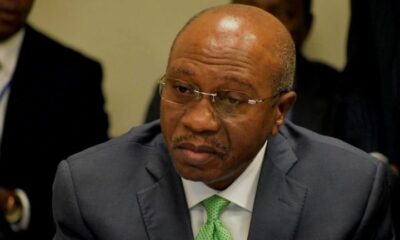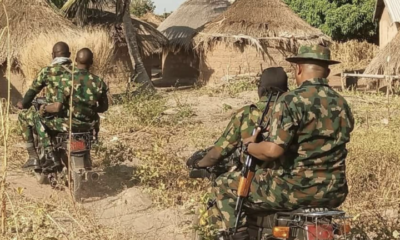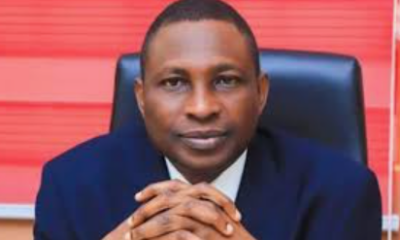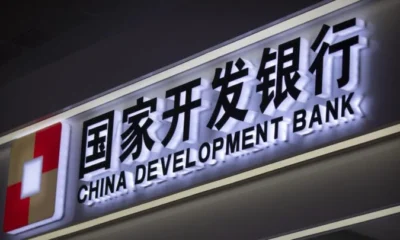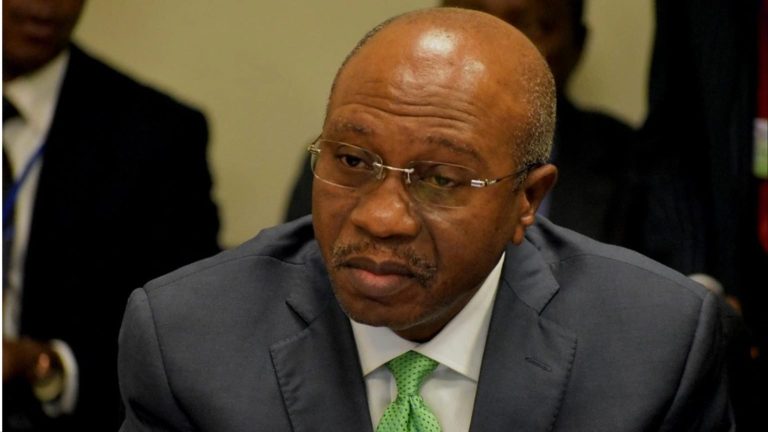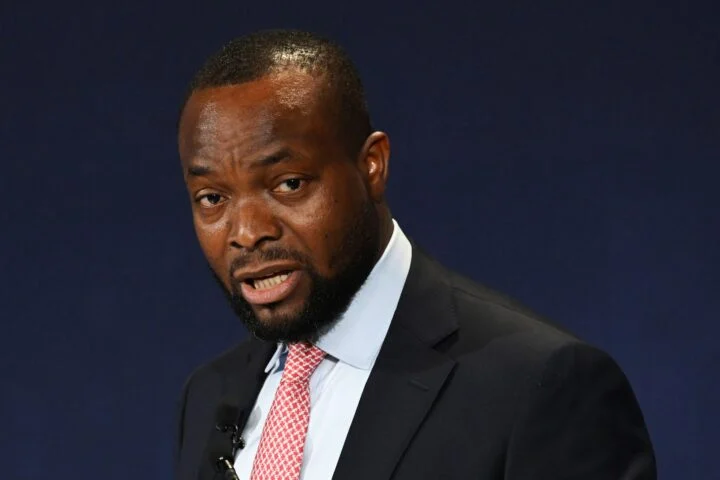- DHQ Vows To Block Security Gaps As Nigeria, Chad, Niger Hold Joint Military Operations
The Nigerian Army, along with their counterparts in Chad, Niger, and other neighbouring countries, has begun joint patrols to contain the cross-border threats posed by the Lakurawa terrorist group.
According to The Punch, this collaborative effort aims to restrict the movement of the group, which has been linked to severe criminal activities in northern Nigeria and its neighbouring countries.
At the same time, the Sokoto State Government has expressed frustration over the difficulty of containing the group due to weak borders.
The Lakurawa group, affiliated with terrorists in the Sahel, particularly from Mali and Niger, became a national security concern after launching its first significant attack on November 4.
Earlier reports indicated that the new terror group had set up camps in 10 Local Government Areas of Sokoto and Bauchi states before its operations became publicly known three weeks ago.
Sources say that members of the terror group initially established camps in villages along the Nigeria-Niger border, including Gwanaguano, Mulawa, Wassinya, and Turigaic communities. They later infiltrated Nigeria, setting up camps in various communities, especially in Gudu and Tangaza LGAs of Sokoto in 2018.
According to The Punch, they use Hausa, Fulfulde, and Arabic languages in their preaching and named their camp Dar-ul-Islam.
“Their ages are between 18 and 50 years. They have been attacking villages in Gudu, Tangaza, Illela, and other local governments to collect taxes, though they did not kill anyone until the recent Mera attack.
“They will count the number of cattle in their custody and calculate the tax based on the percentage which they will take from the cattle,” a community leader in Tangaza LG said.
Dr. Murtala Rufa’i, a researcher with the Usmanu Danfodiyo University, Sokoto, stated that the group had been planning to establish its caliphate for over 25 years.
He revealed that the group had between 1,500 and 1,800 followers, including clerics and youths in the Tangaza and Gudu axis, the ancestral home of the Lakurawa leaders.
Rufa’i also mentioned that the group had been dislodged by combined security forces around 2020 but regrouped in December 2023.
Lakurawa, according to Rufa’i, is a Mali-based group known in the Sahel as Jama’atu Muslimina, with members from various tribes and sects.
He identified the leader of the group as Ahmadu Kofa, whose ancestors were originally from a community called Kofa in the old Kebbi Empire.
Rufa’i said, “He is from Kofa. He has siblings like Ibrahim Kofa, Umar Kofa. They are presently in Mali, but their ancestors were Nigerians, from the Kebbi Empire.
“Their parents and grandparents like Umar Kofa and Sa’idu Kofa had all acquired their religious knowledge in a place called Balle, the present headquarters of Gudu LGA of Sokoto.”
He noted that the group lured locals with money, farm inputs, and pumping machines, adding that some joined Lakurawa because of hunger.
In November, the Nigerian Defence Headquarters confirmed the emergence of the Lakurawa sect, operating primarily in Sokoto and Kebbi states. This came after the group reportedly infiltrated northern Nigeria from Niger and Mali, with their activities intensifying following the coup in Niger.
The group carried out its first major attack in Kebbi State, killing 17 residents and stealing dozens of cattle in the Mera community. Since then, they have continued to wreak havoc in the region.
On December 5, the Zamfara State Police Command Commissioner, Muhammed Dalijan, confirmed that members of the group were responsible for a recent explosion in the state.
Dalijan explained that the terrorists, while fleeing a military assault, planted a bomb under a bridge in the Birnin-Gwari forest. Tragically, the device detonated when a driver unknowingly drove over it.
“This Lakurawa, when they were dislodged by the Army in Sokoto and Kebbi, the rest of them who survived the military onslaught were trying to find new enclaves.
“As they were passing that village to Birnin-Gwari forest, they planted a bomb under a bridge. Then a motorist was passing and stepped on it. It exploded and killed the driver, and three other people were injured,” he said.
In response to the escalating threat, the Federal Government has planned to deploy additional military personnel to the affected areas. However, the terrorists have reportedly exploited Nigeria’s porous borders to evade capture.
Speaking in an interview with The Punch about the military’s measures to strengthen the nation’s borders, the Director of Defence Media Operations, Major-General Edward Buba, on Sunday, stated that the joint patrols would help close the loopholes that allowed the group’s penetration.
He said, “Yes, we have commenced joint patrols with neighbouring countries to block the gaps that enable their penetration.”
Meanwhile, a senior military officer from the 8 Division of the Nigerian Army in Sokoto confirmed the security strategy, stating that troops from the division had established a temporary camp in some of the areas affected by Lakurawa.
The officer told The Punch, “I am sure you know there is peace in those areas previously controlled by Lakurawa in the state, so that tells you that we are in control.”
He added that the Nigerian Army would ensure the state, particularly areas once controlled by Lakurawa, remains secure.
Indications have also emerged that the ongoing security challenges facing Sokoto State are linked to several porous borders between the state and neighbouring Niger Republic.
A security expert in the state, who spoke on the condition of anonymity, confirmed that many of the insecure communities in Sokoto share borders with either another state or country.
He stated that the porous border was one of the major reasons behind the rising insecurity affecting the state.
“You see, the issue of Lakurawa and other security issues in our state have worsened due to the borders that are not secured.
“If you go to places like Illela, Gudu, Tangaza, and Gada, among others, they share borders with either the Niger Republic or other states. The strength of security personnel in the state cannot secure these border communities, which is why the problem keeps increasing.
“Our appeal is not just to the Nigerian Army or police to secure the borders but also to the newly established Sokoto Community Guard Corps to ensure there’s adequate security in these border communities. The local security guards must rise to expectations and contribute their quota to the affected areas.”
When contacted, the Special Adviser on Security matters to the Sokoto State Governor, Col. Ahmed Usman (retd.), assured that the state was doing everything possible to restore peace to the troubled communities.
He said, “I can assure you that these Lakurawa guys have been dealt with; kudos to the troops of the Nigerian Army who have been doing a wonderful job.
“On the issue of fear, that is a constant thing, especially for those people in those affected communities, but with the report we are seeing now, we can see improvement.”
Addressing the issue of porous borders, the retired military personnel confirmed it was a contributing factor, but assured that security personnel were working to address it.
The district head of Gagi community, Alhaji Sani Umar Jabi, also acknowledged that the border had significantly contributed to insecurity for a long time.
He advised the government, particularly the Federal Government, to find ways to ensure the safety of all the land borders in the state.
He also commended security agents for their efforts in maintaining peace in the state.
Credit: The Punch

 BIG STORY4 days ago
BIG STORY4 days ago
 BIG STORY18 hours ago
BIG STORY18 hours ago
 BIG STORY3 days ago
BIG STORY3 days ago
 BIG STORY3 days ago
BIG STORY3 days ago
 BIG STORY2 days ago
BIG STORY2 days ago
 BIG STORY2 days ago
BIG STORY2 days ago
 BIG STORY3 days ago
BIG STORY3 days ago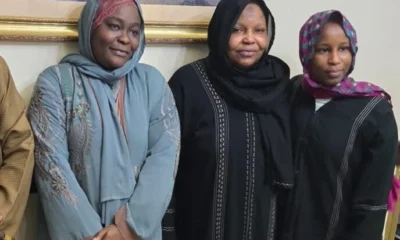
 BIG STORY3 days ago
BIG STORY3 days ago







